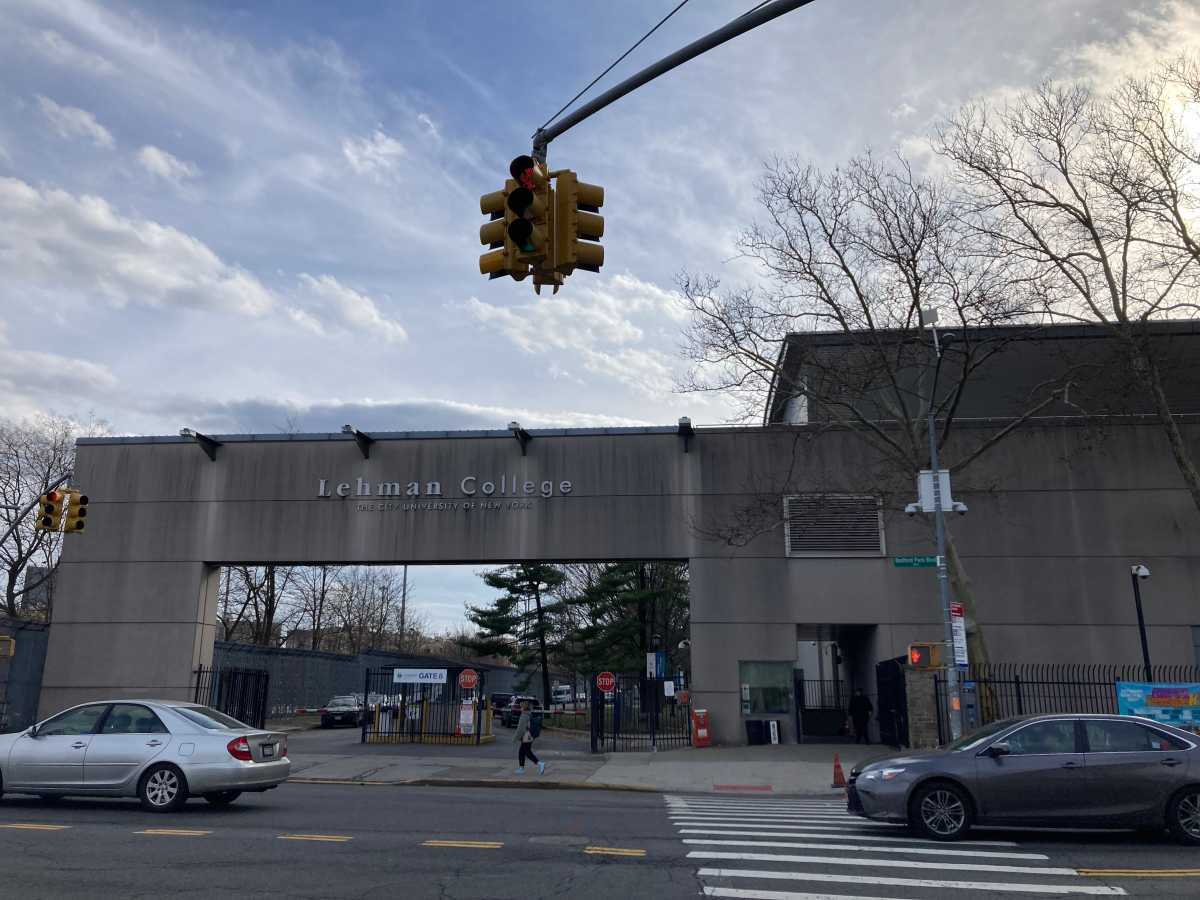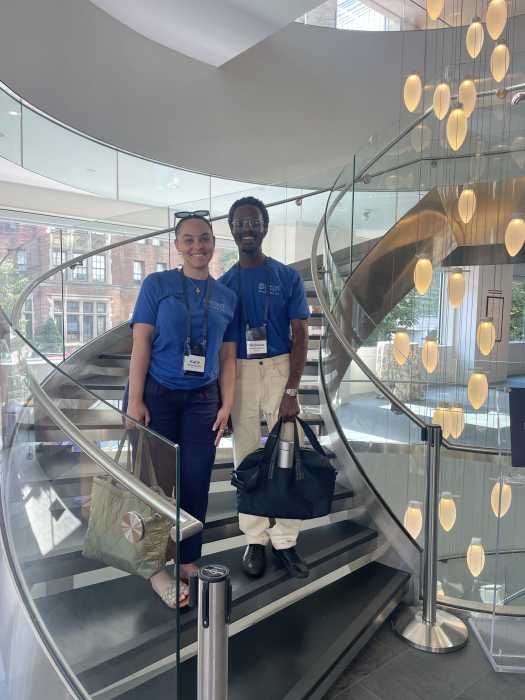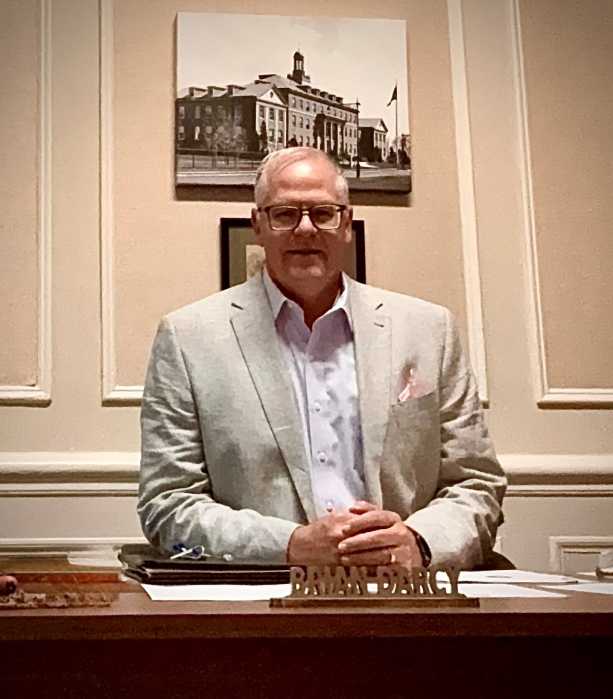In “Globalize the Intifada! Mapping struggles for Palestine between the streets and our classrooms,” panelists said they aimed to “map the necessary relationship between antiracist teaching practices in the classroom” and reimagine “what a community supportive of justice for all [including Palestinians]” would look like.
However, after pushback from local Jewish leaders and alternative media outlets, Lehman’s Literary Institute didn’t see it that way.
“The goal is to bring people together, not to cause harm or make students feel unsafe. It is not a podium for protest,” Jane Kehoe-Higgins, the director of Lehman’s Institute for Literary Studies, said in a social media statement. “After discussion with the panelists, I do not believe we share the same goal.”
Lehman College, through Communications and College Relations Director Mercedes Diez, declined to be interviewed for this story four times. Via email, she didn’t answer specific questions about how the panel was approved in the first place, how the panelists were chosen, or which groups pushed back against the literary institute — only telling the Bronx Times that “while the Lehman administration supports the outcome, the college had no role in the decision-making process.”
Similarly, Kehoe-Higgins did not respond to two Bronx Times voicemails and two emails requesting an interview.
However, a statement attributed to Assistant Vice President for Communications and Marketing Richard Relkin asserts the college’s position.
“We support the conference organizer’s decision to cancel the panel since its polarizing title was not reflective of the conference theme and does not align with campus policy,” Relkin said.
After scrapping the panel, Lehman College’s Institute for Literary Studies postponed the Engagement, Equity and Antiracism conference altogether.
Decades of pain behind a word
The cancellation of the conference came about four months after Hamas — designated a terrorist organization by the U.S. State Department — launched its attack on Israel on Oct. 7, 2023. Many Bronx politicians immediately came out in support of Israel following Hamas’ assault, although some politicians and groups are less staunch in their support now — as more than 33,600 Palestinian people have been killed and another 1 million are on the brink of starvation. U.S. President Joe Biden and the State Department are backing Israel and its security.
One local politician who has been steadfast in his support for Israel is Democratic Council Member Eric Dinowitz. He represents the Bedford Park, Norwood, Kingsbridge, Riverdale, and Woodlawn areas in the Bronx’s Council District 11.
Dinowitz, who is Jewish and is the chair of the City Council’s Jewish Caucus, was one of the panel’s primary critics — slamming the organizers and CUNY on social media, claiming that the panel “further institutionalize(d) antisemitism,” likening anti-Jewish sentiment on campus to “malignant cancer.”
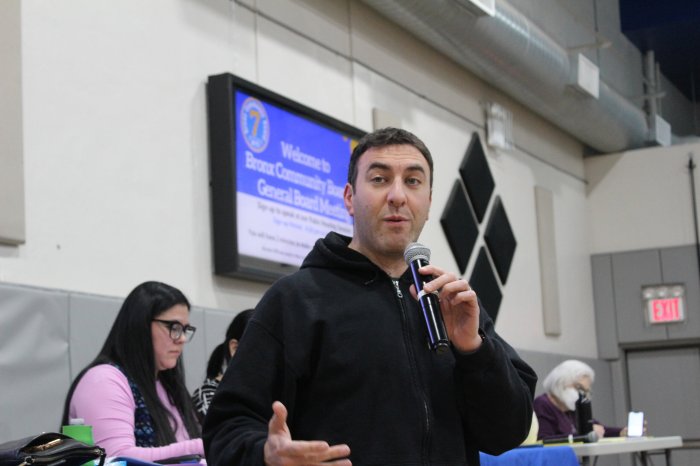
In an interview with the Bronx Times, the council member said to him the word intifada constitutes “a global call for violence” that “should not be taught” at schools. After he found out about the scheduled panel, Dinowitz said he called Lehman leadership to urge officials to rethink the discussion. Dinowitz’s office, however, did not answer specific questions about the scope of his involvement in getting the panel axed.
Panel moderator Britt Munro and speakers Conor Tomás Reed and Lucien Baskin argued — in an editorial about the discussion’s cancellation — that intifada is an Arabic term referring to “the act of rising up against oppressors.” They render it virtually synonymous with terms like abolition and collective liberation.
“To globalize the intifada at Lehman College means to work in solidarity with colonized people … resisting colonialism, racism, and imperialism from wherever we are,” they wrote.
Munro — a Lehman College fellow, English CUNY Graduate Center PhD student, and organizer with CUNY for Palestine — originally agreed to be interviewed by the Bronx Times for this story but didn’t respond to four subsequent scheduling requests. Reed is an author and program director of the activism institute Shape of Cities to Come, and Baskin is an urban education CUNY Graduate Center PhD student and organizer for CUNY for Palestine, according to their editorial bios.
The trio, however, did recognize other associations of the word intifada in their piece — both as a movement of “nonviolent civil resistance” against the state of Israel and also as “the right to armed resistance against Israel as an occupying force.”
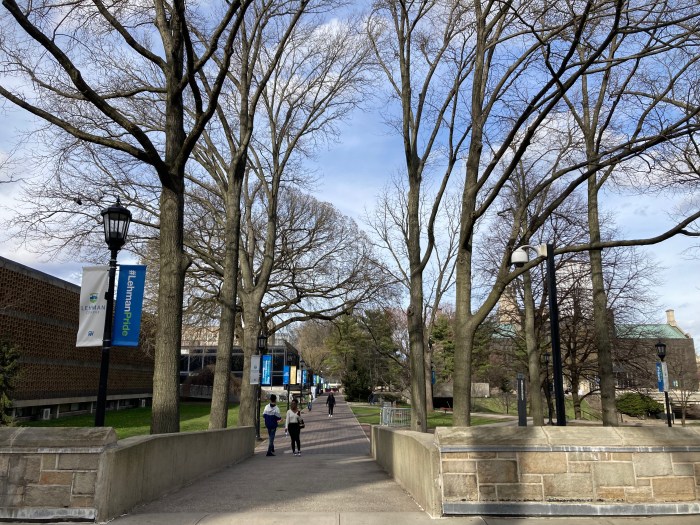
The subject matter of the controversy, the conflict between Palestinians and Israelis, goes back decades to when the nation of Israel was established in Palestine as a safe haven in 1948 after the end of World War II — after 6 million European Jews were killed in the Holocaust. However, tensions rose between Jewish arrivals and Arabs already living in Palestine — many of them Muslim with their own religious connections to the land.
“The struggles for Palestine,” as the title of the panel denotes, references life under occupation. Around 20 years after Israel captured Palestine from Egypt in the 1967 Six-Day War, Palestinians rose up in what’s known as the First Intifada, carrying out mass boycotts and attacks. From 2000-2005, Hamas militants launched the Second Intifada, but this time using more deadly tactics like suicide bombings, rocket attacks, and sniper fire. In both uprisings, after Israel’s counter-military attacks, Palestinian deaths far outnumbered Israeli deaths.
Dinowitz said that when he hears the word intifada, he thinks of the pain and bloodshed of Jewish people in this historical context.
“Despite the literal definition of the word, it is a call for violence,” he said. “There are many people who want to erase the experiences of Israelis or of the Jewish people, which is not a progressive value.”
But Munro, Reed and Baskin said in their piece they associate intifada with the pain of a life under occupation, a word they haven’t been shy to use since their discussion at Lehman’s conference was canceled. The trio signed the end of their editorial: “Long live the intifada!”
“The call has become highly charged on U.S. college campuses precisely because it has the courage to publicly reject the Israeli settler colonial project,” they wrote.
Jonathan Soto, a progressive candidate running against longtime East Bronx Democratic Assemblymember Michael Benedetto, has been vocal about his support for Palestinian resistance. At a cafe in Harlem in February, the candidate told the Bronx Times that censoring the word intifada is dangerous and it poses an unfair burden on Muslims as opposed to non-Muslim religious groups.
“I grew up very Christian; my parents were ministers,” Soto said. “They want to spread the Kingdom of God.”
He gave an example of the historical context of Christians spreading their creed using this language, saying it’s been “justified by Christians to do crusades and massacres in the 1300s and 1400s.”
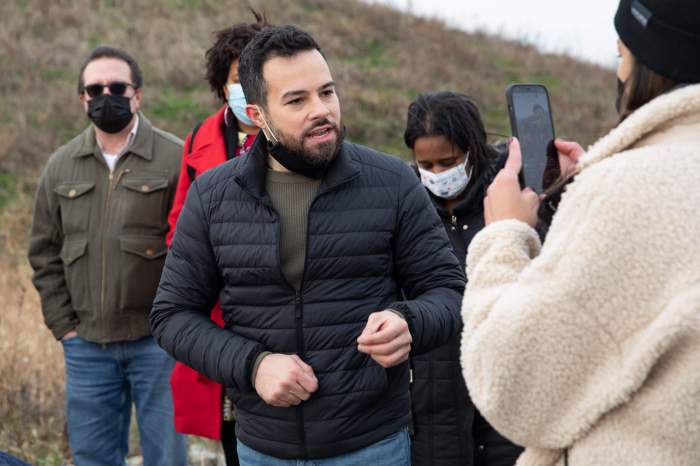
“To say that ‘Oh, I have to cancel somebody saying globalize the intifada,’ then you would have to cancel, at the same time, people that are using Kingdom of God,” Soto said.
The climate on campus
On college campuses across the city and country, questions about race and religious relations have been difficult even before the events of Oct. 7 — but this most recent attack has brought them to the fore once again.
Last month, an undergrad student at Lehman told the Bronx Times that she mostly studies remotely, so she hasn’t heard much about the ongoing war in the Middle East. A grad student, meanwhile, said she knows a large Muslim population at Lehman, but besides a flier she received for one protest, she hasn’t seen any real strife. Furthermore, a STEM student told the Bronx Times that he had witnessed a demonstration on campus earlier this year and that he’s observed students discuss the conflict in different group chats he’s in — but not much more than that.
“I wouldn’t say ‘charged,’ there hasn’t really been much conflict,” he said. “I remember when the war broke out [on Oct. 7] and when I was taking general chemistry II, there was like, a lot of texts. I just woke up one night to like 500 texts from students and they were talking about it.”
None of the students the Bronx Times spoke with last month had heard of the literary institute’s panel or the decision to nix it.
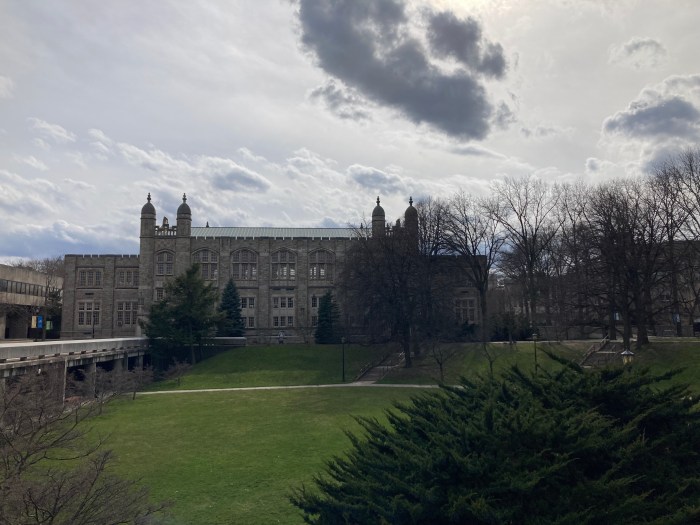
Neither had Susan Jacobowitz, a CUNY literature professor at Queensborough Community College (QCC) — who found out about the panel after it was canceled through a Bronx Times interview request.
She said she felt like she was going to faint when she first heard the title.
“I think that’s insane at Lehman,” she said. “The context matters for words.”
Jacobowitz, who is Jewish and the daughter of a Holocaust survivor, holds a doctorate in English literature, and her primary area of scholarship focuses on descendants of Holocaust survivors. Years ago, she taught a special topics course at QCC titled “The Literature of the Israeli-Palestinian Conflict,” and she generally teaches a Holocaust unit in introductory literature classes.
But these days, she said, it’s becoming increasingly difficult for her to separate current events from academia.
“We do a little poetry, we do a couple of short stories, and then I usually take them to the Kupferberg Center on campus,” Jacobowitz told the Bronx Times, referring to the Holocaust education laboratory at the college. “But this semester was so difficult.”
She said her father, now 95 years old, was taken from his home in former Czechoslovakia when he was 15 years old and put into concentration camps, including Auschwitz. Jacobowitz said that he was liberated after World War II and came to the U.S. when he was 17 with the Committee for the Care of European Children. Once he landed in New York, he attended Theodore Roosevelt High School in the Bronx’s Belmont section.
While the majority of his family was killed, Jacobowitz said her father had a few cousins survive and end up in Israel. She visited her family for the first time when she was 15 and returned in 2006 for an Israel studies fellowship.
Jacobowitz — while she expressed sadness at the current Palestinian death toll — couldn’t help but notice what she claimed was “callousness towards Jewish life” in her circles in New York City after the most recent conflict broke out. She said people seemed to care on Oct. 7, but “when the body count on the other side became larger, it was no longer relevant.” Some of her family members in Israel know people, she said, who have been killed or taken hostage.
“I think the left is very firmly fixated on the Palestinian narrative, which is not inappropriate. There’s a really compelling story there,” she said. “But again, I don’t think they really understand what they’re saying sometimes.”
Jacobowitz said she was visiting her father the weekend of Oct. 7, just before she returned to campus and started teaching her Holocaust unit.
“And I thought, ‘Oh my God, I just can’t — I can’t even bear it,” she said. “I can’t even stand it.’”
In the months after the Oct. 7 attack leading up to the panel, New York Gov. Kathy Hochul zeroed in on antisemitism on college campuses, pledging $75 million in hate crime prevention and security grants. She’s also appointed a judge to review antisemitism and anti-discrimination policies on CUNY campuses.
The hate is found citywide. According to NYPD data, Jewish people were the victims of the vast majority of reported hate crimes across New York City in 2023 — with a spike at the end of the year after the Oct. 7 attack. From January through September of last year, there was an average of 18 antisemitic hate crimes reported per month. In October, November and December 2023, those numbers jumped to 59, 60, and 43, respectively.
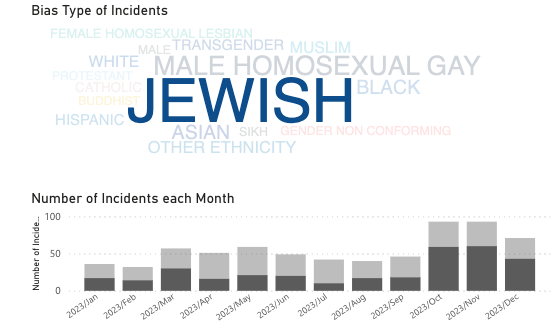
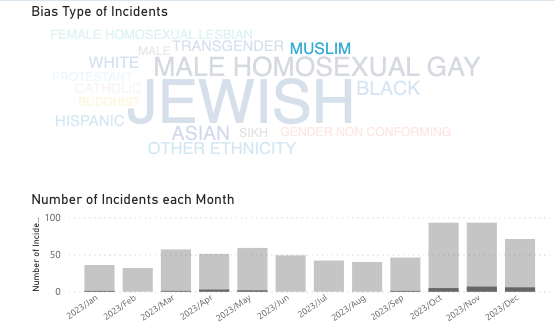
Soto — the East Bronx state Assembly candidate — sympathized with “the concern for Jewish students on campus.” But he also said that he thinks intervention at Lehman in this instance is a violation of the First Amendment. He even warned more generally that “censorship and policing of opposing views” is causing the country to slowly descend “into a fascist” state.
This First Amendment concern has been on display citywide in recent months. In October, a pro-Palestine rally at Brooklyn College was moved off campus by officials. Columbia University in November suspended its campus chapters of Students for Justice in Palestine and Jewish Voice for Peace for an “unauthorized” walkout demonstration, and this month again suspended a handful of pro-Palestinian students who the university claims support terrorism.
“We need to be able to do two things in CUNY campuses and in New York state: We need to make sure that both Palestinian and Jewish students feel safe, but we also have to protect democracy and protect free speech,” Soto said.
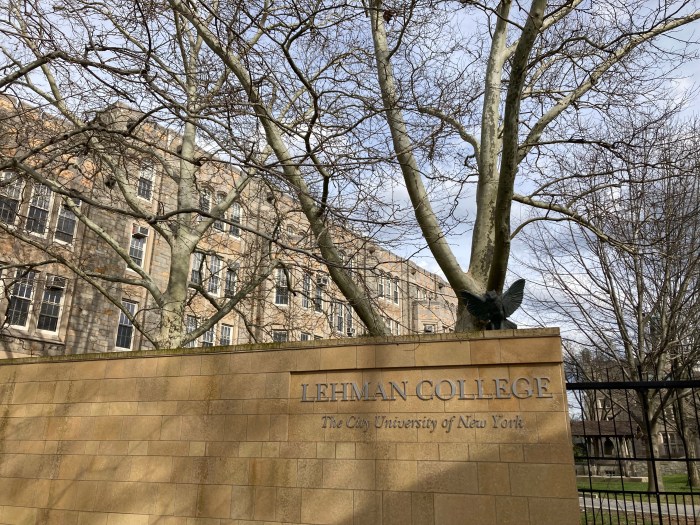
Munro, Reed and Baskin agree with this sentiment, stating in their editorial that Lehman’s Writing Across the Curriculum (WAC) program, which was going to put the panel on, changed the title without notifying them before axing it altogether. They said they were disappointed with the way “WAC coordinators weaponized” language “to silence support for Palestinian liberation.”
“The decision of the organizers to cancel the panel and distance themselves from us panelists in the face of zionist vitriol shows a blatant disregard for other forms of safety,” their editorial reads. “Organizers failed to enquire once as to the wellbeing of any of us, or to offer support or guidance in navigating the online hate that arose in response to the panel (note that one among our panelists is an undergraduate Muslim woman student whose name was published across multiple news outlets).”
‘We’re not having enough of these conversations’
The controversy surrounding the now-canceled panel at Lehman is nuanced. The Bronx Times identified pain and suffering as central themes, although the context of every perspective varied. But that still begs the question: Are there any universal truths about how people should discuss the conflict? And is there a space where both Jewish and Palestinian people can be validated?
Dinowitz, the Riverdale city council member, said that schools should be able to address the conflict, but this panel seemed like a double standard. He did, however, tell the Bronx Times that he hadn’t seen the panel presentation before it was nixed.
“Would a panel that encourages any other form of hate against any other group be considered protecting students or be considered censorship?” Dinowitz said. “There’s a difference between having a dialogue and then having people of authority in an educational space teach students something that, in my view, is unacceptable.”
Jacobowitz claimed that while the Lehman College Institute for Literary Studies panel missed the mark because of its arguably hateful language, there are other discussions that can be educational. She offered one — a Modern Language roundtable next January, where she’ll be speaking about texts that depict the Jewish and Palestinian experience.
Jacobowitz also thinks it’s critical to dispel the talking points that value one life over another.
“There’s sometimes a kind of hierarchy of suffering and when you teach something like genocide or the Holocaust … you try to stay away from that because it’s not a competition,” she said. “It’s meaningless to try to argue about what’s the worst or who had it the worst. It’s to acknowledge all of the suffering.”
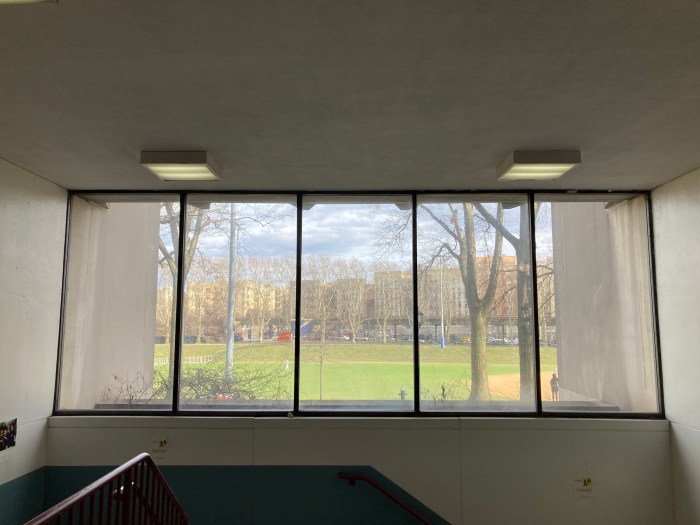
Soto said he thinks a space exists for both groups, but the first step is a ceasefire in the Middle East.
“It’s going to be impossible to have discourse without that immediately,” he said.
Soto also said he supports a school system that “encourages discourse and dialogue” about Jewish-Palestinian relations all the way down to elementary school — while protecting free speech.
“I think that we’re not having enough of these conversations,” he said, arguing that a lot of media coverage he’s seen has framed the issue in a pro-Israel versus a pro-Palestine binary.
“I do think it’s important to have in-person dialogue, which is why I’m so upset that the CUNY discussion didn’t happen,” Soto added.
The panelists wrote in their editorial that they still plan to host their discussion “at a larger venue soon,” although the Bronx Times didn’t confirm if it had already happened or if it’s in the works.
Diez, Lehman’s communications director, said the literary institute’s full anti-racism conference will take place in the fall, but she didn’t provide a date.
Reach Camille Botello at cbotello@schnepsmedia.com. For more coverage, follow us on Twitter, Facebook and Instagram @bronxtimes

